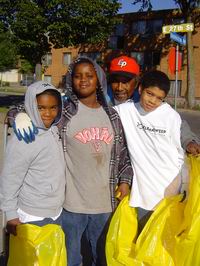Citizens and Law Enforcement Action Network Has Strong Debut
Phillips “CLEAN”s Up with Focus on Redidivism, Litter
All smiles at the Phillips Community CleanSweep.
December 2004—Inspector Scott Gerlicher of Third Precinct said CLEAN has quickly proven the most sophisticated of several crime-watch programs in the city, thanks to support from highly networked community groups in Phillips.
Though numbers on the first six months of the program are still being tabulated, Gerlicher said CLEAN has put a palpable dent in criminal activity in the precinct’s most afflicted corridors – and has enabled law enforcement and the community to work better together at a time when slashed departmental budgets have resulted in fewer officers on the street and fewer prosecutions of livability crimes in the court system.
“It’s really there in the name: Citizens and Law Enforcement Action Network,” he said. “Every word has delivered on its part of the solution.”
CLEAN has been so effective, Gerlicher said, that he will seek to expand its focus to include prostitution. Thus far, the program has focused on tracking repeat offenders with histories of narcotics, robbery, loitering and assault.
Community groups propose more help
In the next year, the Third Precinct and the understaffed city attorney’s office may have additional reason to thank the community for its participation in CLEAN.
In a joint project, Phillips Weed & Seed and the Powderhorn Park Neighborhood Association are assembling grants to create a community staff position to research, document, and build cases on misdemeanor offenses going into Judge Hopper's Livability Court. Better cases, said Gerlicher, will mean stronger sentencing and fewer offenders back on the street after only a day or two in jail.
Elena Gaarder, director of PPNA, said the requested a two-year, $125,000 Empowerment Zone grant would also be used to expand PPNA’s Midtown Restorative Justice Program into Phillips.
“We have been helping people who commit these livability crimes turn their lives around through Restorative Justice and feel that supporting CLEAN is a natural complement, letting us address both the causes and effects of self destruction, poverty and crime."
How CLEAN works
Begun in May, CLEAN is based on a core tenet of other anti-crime programs backed by the Phillips Partnership – that a relatively small number of chronic offenders are responsible for the preponderance of criminal complaints and tend to return to familiar streets after they pass through the revolving-door justice system for minor crimes.
CLEAN works this way: Lt. Rick Thomas of the Third Precinct regularly updates a list of chronic offenders active in three hot spots: Lake Street (Chicago to Cedar), Bloomington Ave (24th to Lake) and Franklin Ave. (Portland to Elliot). The repeat criminals he tracks, with the help of City Attorney Scott Christenson, have tripped a combination of alarms within the city’s law enforcement database – active warrants, multiple arrests, suspect in multiple crimes, conditional stays of sentencing.
The CLEAN list gets distributed through the email networks of neighborhood organizations, business associations, Phillips Weed & Seed and the Phillips Partnership, among several others. Beat officers also carry the list, as do community SAFE officers and probation enforcement officers. Enforcement encourages victims to file Community Impact Statements to bolster their cases, increasing the likelihood of sentencing.
Early results, long-term perspective
In August, Lieutenant Thomas issued a report on the program’s first two months. The results were dramatic: of the 34 chronic offenders that debuted on the CLEAN list, six have been sentenced to prison time. Five more received workhouse time in excess of 60 days. Twelve had pending cases that could result in a stiff sentence. In all, 23 of the original 34 had been impacted by the collective efforts of the Phillips community and law enforcement.
Gerlicher said that while grassroots organizations are the backbone of the community effort, the participation of influential sponsors like the Phillips Partnership is particularly useful in pressuring the judiciary to hand down stiffer sentences. He said that dealing with chronic offenders must be seen as a top-down community priority.
“Judges need to be urged to view minor offenders not as a string of individual cases but a broader livability issue. When they see that it’s not just a few angry neighbors complaining that this guy or that guy is attracting trouble on this or that block, but that this offender is standing in the way of community well-being in the larger scheme of improvements and investments, then you start to see less tolerance for blight.”
Phillips Neighborhoods Unite for "CleanSweep"
More than 300 volunteers warmed up a very chilly morning by participating in the Phillips community "CleanSweep" on October 2.
Fanning out from Park and Bloomington Avenues, they picked up street and residential trash throughout Phillips West, Midtown, East Phillips and Ventura Village. It was the first time that the four Phillips neighborhoods have united for a community event.
Muriel Simmons, chair of the Phillips West Neighborhood Organization, said, “We had an amazing turnout and we showed what this community can do by uniting.”
The CleanSweep, planned as the first in a series of anti-crime, quality-of-life events in Phillips, was sponsored by the Phillips Partnership and Phillips Weed & Seed.

